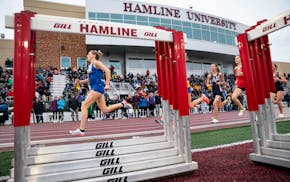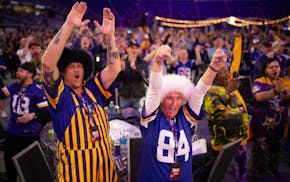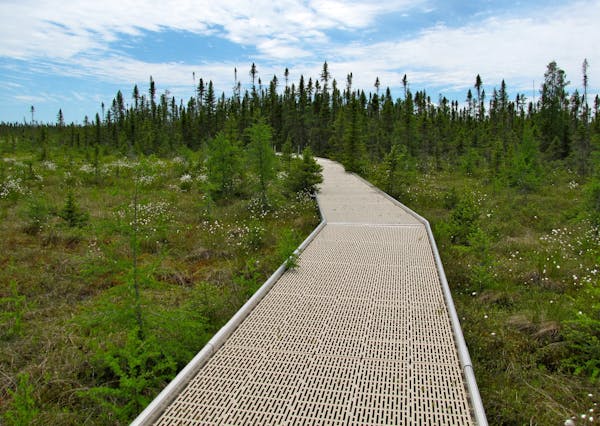On a recent day, beneath a warm sun on the western fringe of the Twin Cities, Pa Chia Thao was surrounded by her past, and her future.
This was at Voyageur Environmental Center, owned by the Boys and Girls Clubs of the Twin Cities, and among tall trees that framed the shoreline of a picturesque lake, kids were doing what kids do at summer camps.
Canoeing. Fishing. Playing.
The scene was in marked contrast to the inner-city neighborhoods where most of the campers — many of them kids of color — live the other 51 weeks a year.
Thao herself is from such a neighborhood.
Born in Thailand, she grew up in public housing in St. Paul. As a kid, she was shy, she said, and joined the neighborhood Mount Airy Boys and Girls Club at age 7, looking for friends and help with her homework.
"My family was very traditional Hmong in its expectations of girls,'' she said. "For me, the Boys and Girls Club was an escape to be the person I am.''
The person Thao is, she would learn — thanks, she says, to the Boys and Girls Club's leadership and other skills programs — is achievement-oriented.
A graduate of Mounds Park Academy, a private Twin Cities high school, Thao will be a second-semester freshman this fall at Mount Holyoke College in Massachusetts.
She attended Mounds Park on a scholarship, and also earned a scholarship to Mount Holyoke.
Now a counselor at Voyageur, Thao watched the other day as a few score giddy kids assembled in advance of their much anticipated noon lunch.
Some talked about the sunfish they had just caught, others about the bows they would shoot at the camp's archery range, still others about the overnight camping trip they had taken.
Not many years ago, Thao was also a Voyageur kid.
"Here, kids can immerse themselves in nature, and forget any troubles they have,'' she said.
With eight metro locations, Twin Cities Boys and Girls Clubs provide safe places kids can go after school and during summer vacations. Membership is nominal, $5 a year. But if a kid can't pay, that's OK. It'll be worked out.
This isn't a baby-sitting organization. The point, Boys and Girls Clubs leaders say, is to give kids the skills they need to do well in school, interact with other people, and make healthy behavioral choices.
Kids ages 5 to 19 are welcome, and about 12,000 Minneapolis and St. Paul area youngsters belong to the clubs, with a peak membership age of about 13.
For many of the kids, the highlight of their year is attending Camp Voyageur for a week.
"Our kids don't typically experience a lot of the 'outdoors' where they live,'' said Erin Carlin, president and CEO of Boys and Girls Clubs of the Twin Cities. "Initially, it can be quite scary to them to hear a cricket at night, or the sounds you might hear around a campfire.
"But getting them into nature and the outdoors challenges them to do things they didn't think they could. This connects them to staff, builds their confidence and self-esteem, and teaches them how important it is to protect our environment.''
Shaniah Juah, 13, of St. Paul has been a Boys and Girls Club member for seven years, going to her local club every day after school, and throughout the summer. A Voyageur camper since she was 8, she wants to be either a teacher or a cosmetologist when she grows up.
"Fishing,'' she said, when asked what she liked most about camp.
Then, giving the question a second thought, she added, "Everything.''
Actual cost to attend Voyageur for a week is $500. But kids pay only $20 (this also can be forgiven if necessary). The rest is raised from individuals, foundations and corporations as part of the Twin Cities Boys and Girls Clubs' annual $4.4 million budget.
Modern and well-kept, the camp is as inviting as any in the state, thanks in large part to donors such as Cargill Corp., among others. Cargill, for instance, donated much of the money that built the camp's eight new cabins in 2009.
"Sleeping in the cabins is a lot of fun for the kids,'' camp program director Nick Sacco said. "But at bedtime, we want everyone to be in their beds at a certain time and quiet at a certain time, ready to hear a story from their counselor.''
Varied programs for varied needs
Twenty-year-old Rashad Cohen is in his first year as a Voyageur counselor. A graduate of Minnetonka High School, where he was a football and track standout, his goal this summer, he said, is to be a positive role model for campers.
Cohen will be a junior this fall at South Carolina State University, a historically black school.
"Growing up in Minnetonka, I was a minority,'' he said. "I attended St. Cloud State for a while, but then transferred to South Carolina State because I wanted a different kind of experience.''
Looking for a summer counselor job, Cohen e-mailed Voyageur and other, similar camps.
"I can't put into words how satisfying the opportunity has been to be with these kids,'' he said. "One camper last week told me he was happy to be here because he didn't have to worry about being jumped by a gang member.''
Diamond Thlang, 11, a student at Capitol Hill Magnet School in St. Paul, is among club members attending Voyageur this summer for the first time.
Confident and focused while eating lunch recently, he said, "I'm coming back for leadership school.''
Which would suit Carlin, the group's CEO and president, just fine. A goal of Twin Cities Boys and Girls Clubs, she said, is to "see kids as often as we can.''
"We try to address the needs of the whole child, emotionally, physically and mentally,'' she said. Hearing and vision tests have been part of this effort, as well as dental checkups. Clubs also offer computer access, so kids can keep up with changes in technology.
This comprehensive approach pays off: 93 percent of club seniors graduated on time in 2012, far above the Minneapolis and St. Paul public school averages.
Pa Chia Thao considers herself among the lucky ones.
"I've come so far,'' she said, "and I'm so thankful to the Boys and Girls Clubs, and especially to Camp Voyageur for the opportunities I've had.''
Dennis Anderson • 612-673-4424

Yes, it was a great night for the Vikings at the draft

Hamline Elite Meet, already in rare air, presents co-ed look for track
Bevy of defensive playmakers are available in Round 2 of the NFL draft after historic offensive run
Twins bring momentum on road despite Angels Stadium struggles

